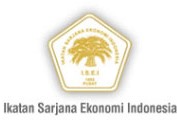TINGKAT EFISIENSI PRODUKSI DAN PENDAPATAN PADA USAHA PENGOLAHAN IKAN ASIN SKALA KECIL
(1) STIE Bank BPD Jateng
(2) STIE Bank BPD Jateng
Abstract
The aim of this research was to measure the level of production efficiency and calculate the return and cost salted fish processing small scale in Pekalongan municipality. There are 20 business owners of small scale processing of salted fish were sampled with snowball sampling. Stochastic Frontier Analysis is used to measure the level of efficiency and descriptive statistics are used to calculate the ratio of return and cost. The results of this study show that the average technical efficiency is 0.7339, which means that the salted fish processing business in Pekalongan has not fully carried out its activities efficiently so that it is still possible to improve.Factors that influence the production of salted fish in Pekalongan is availability of fish, labor, equipment or facilities, auxiliary materials and extensive effort. Salted fish processing businesses in Pekalongan small scale is still quite favorable, as indicated by the R/C value of 1.37 which indicates that the amount of revenue entrepreneurs of small-scale fish processing is still greater than the costs to be incurred in running the business.
Penelitian ini bertujuan untuk mengukur tingkat efisiensi produksi dan menghitung rasio biaya dan pendapatan usaha pengolahan ikan asin skala kecil di kota pekalongan. Sampel dalam penelitian ini adalaah 20 pemilik usaha ikan asin dengan metode snowball sampling. Analisis frontier stokastik digunakan untuk mengukur tingkat efisiensi dan metode deskriptif statistik digunakan untuk menghitung rasio biaya dan pendapatan. Hasil penelitian ini menunjukan nilai rata-rata efisiensi teknis sebesar 0,7339 yang berarti pelaku usaha pengolahan ikan asin di Kota Pekalongan belum seluruhnya melakukan kegiatannya secara efisien sehingga masih dimungkinkan untuk ditingkatkan. Faktor yang mempengaruhi efisiensi usaha ikan asin di kota pekalongan adalah ketersediaan bahan baku ikan, tenaga kerja, peralatan usaha, bahan penolong, dan luas usaha. Usaha pengolahan ikan asin di pekalongan masih menguntungkan, hal ini dapat terlihat dari nilau R/C sebesar 1,37 yang mengindikasikan keuntungan usaha masih lebih tinggi dibandingkan biayanya dalam menjalankan kegiatan usaha.
Keywords
Full Text:
PDFReferences
Aigner, D.J. & Chu S.F. (1968). On estimating the industry Production function. American Econo- mic Review. 58:226-239
Aigner, D.J. et al. (1977). Formulation and Estimation of Stochastic Frontier Production Function Model. Journal of Econometrics, 6:21-37
Angeles, M DÃaz., and Rosario Sánchez .2002. Firms’ size and productivity in Spain: a stochastic frontier analysis. University of Valencia,
Joesron., dan M. Fathorozi. (2003). Teori Ekonomi Mikro. Dilengkapi Beberapa Bentuk Fungsi Produksi. Jakarta: PT Salemba Emban Patria.
Kartasapoetra, AG. (1998). Pengantar Ekonomi Produksi
Pertanian. Jakarta: Bina Aksara Jakarta
Kumbhakar, SC., & C.A.K Lovell. (2000). Stochastic Frontier Analysis. Cambrige: Cambrige Univer- sity Press.
Kusnadi. (2002). Konflik Sosial Nelayan Kemiskinan dan
Perebutan Sumber Daya Alam, LKIS.Yogyakarta.
Department of Economic Analysis, Faculty of . (2003) Akar Kemiskinan Nelayan, LKIS.
Economics, Campus dels Tarongers, Av. Dels
Yogyakarta
Tarongers s/n, 46022 Valencia, SpainJEL: C23, . (2007). Strategi Hidup Masyarakat Nelayan.
J21, J29 and L60
LKiS Yogyakarta.
Baek, H. Young., and Jose A. Pagan (2003) Execuitve . (2010). Kebudayaan Masyarakat Nelayan dalam
Compensation and Corporate Production Effi- ciency: A stochastic frontier approach. Quaterly Journal of Business and Economics. 40 (1&2):27-
BPS. (2009). Indonesia dalam Angka. Badan .Jakarta: BPS Website http://www.bps.go.id diakses pada tanggal 5 Januari 2013
.(2000). Indonesia dalam Angka. Jakarta: BPS Website http://www.bps.go.id diakses pada
Jelajah Budaya Tahun 2010. Yogyakarta: Kemen- terian Kebudayaan Pariwisata
Meeusen, W., and Van den Broeck J. (1977). Efficiency estimation from cobb-douglas production functions with composed error. International Economic Review 18:435-444
Nicholson, W. (1995). Teori Ekonomi Mikro. Prinsip
Dasar dan Pengembangannya. Jakarta: PT Radja
Grafindo
tanggal 5 Januari 2013 Olujenyo, F.O. (2006). Impact of Agricultural Develop-
.(2006). Jawa Tengah Dalam Angka 2006. ment Programme (ADP) on the quality of social
Semarang: BPS Semarang existence of rural dwellers in developing
, (2007). Jawa Tengah Dalam
Semarang: BPS Semarang Angka 2007. economies: the Ondo State (Nigeria) Agricul- tural Development Programme experience. Int.
Budiharsono, S. (2001) Teknik Analisis Pembangunan Wilayah Pesisir dan Lautan. Jakarta: Pradnya Paramita
Coelli, TJ., D.S.P Rao., and GE. Battese, (1998) An Intoduction to efficiency and Productivity Analy- sis. Kluwer Academic. Publisher, Boston
DKPP. (2013). Produksi Pengolahan Ikan Kota Pekalo- ngan. Kota Pekalongan: Dinas Kelautan Peri- kanan dan Pertanian.
Giannakas, Knstantinos., Kien C. Tran., and Vangelis Tzouvelekas. (2003). On Choice of Functional form in Stochastic Frontier modeling. Empirical Economics. 28: 75-100
Habib, Michel A., and Alexander P. Ljungqvist. (2000).
Firm Value and Managerial Incentives: A Stochastic Frontier Approach . London Business School, Sussex Place, Regent’s Park, London, NW1 4SA
Herlambang, T. et al. (2001) Ekonomi Makro: Teori
Analisis dan Kebijakan. Jakarta: Gramedia.
J. Rural. Manage., 2(2):213-226.
Oyewo, I.O. et al. (2009) Determinant of Mize Production Among Maize Farmers in Ogbomoso South Local Goveernment in Oyo State. Agricultural Journal 4(3):144-149
Parsons, Leonard J. (2004). Measuring Performance Using Stochastic Frontier Analysis: An Industrial Salesforce Illustration. Institute for the Study of Business Markets The Pennsylvania State Uni- versity 402 Business Administration Building University Park, PA 16802-3004
Samad, Q.A., & Patwary F.K. (2003). Technical efficiency in textile industry of Bangladesh : an application of frontier production function. International Journal of Information and Management Sciences. Vol.14.no 1 p.19-30
Soekartawi. (2003). Prinsip Ekonomi Pertanian. Jakarta: Rajawali Press.
Stoner, F.J. (1995). Manajemen. Jakarta:PT. Penerbit
Hallindo.
Sukirno, Sadono. (2000). Pengantar Teori Mikro ekonomi. Jakarta: Raja Grafindo
Susantun, I. (2000). Fungsi Keuntungan cobb-Dauglas Dalam Pendugaan Efisiensi Ekonomi Realtif. Jurnal Ekonomi Pembangunan. Vol.5 No.2. hal
-161
Tasman, Aulia. (2006) Ekonomi Produksi. Teori dan
Aplikasi. Edisi I. Chandra Pratama. Jambi
Undang-Undang No. 20 Tahun 2008 Tentang Usaha
Mikro, Kecil, dan Menengah
Yuk, Shing Cheng., and Dic Lo. (2004). Firm Size, Technical Efficiency and Productivity Growth in Chinese Industry. Department Of Economics Working Papers No. 144. School of Oriental and African Studies University of London, UK.
Zen .et al. (2002). Technical Efficiency of The Driftnet and Payang Seine (Lampara) Fisheries in west Sumatra, Indonesia. Journal of Asian fisheries Scince. vol.15 2002. p. 97-106.
Refbacks
- There are currently no refbacks.

This work is licensed under a Creative Commons Attribution 4.0 International License.






